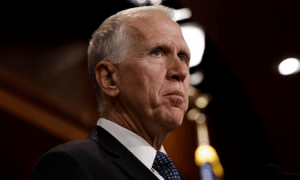Rep. Liz Cheney has become an unexpected hero for Democrats. She was one of the few Republicans to vote to impeach President Donald Trump last year, has served as one of his most vocal critics in the GOP and is the vice chair of the House select committee investigating the January 6, 2021, insurrection at the US Capitol.
But we shouldn’t mistake adoring press coverage and bipartisan bona fides for popularity in the place where popularity matters most for Cheney: Wyoming.
A look at the data reveals that Cheney should be regarded as the clear underdog in her efforts to retain her seat.
Polling from Wyoming is limited, but what does exist paints an ominous picture. The Cooperative Election Study (CES), a large academic survey, asks Americans whether they approve or disapprove of their member of Congress. The sample sizes in each district are usually in the lower 100s or fewer, though the trend is illuminative.
Cheney sported a 72% disapproval rating in the late 2021 edition of the survey, which was fielded about 10 months after she voted to impeach Trump. That was up nearly 40 points from her 26% disapproval rating in the late 2020 version, which was fielded before Cheney’s vote. All told, Cheney was the least popular member of Congress in the 2021 survey.
This lines up with what more recent internal polling of the August Republican primary for Cheney’s at-large House seat in Wyoming is showing — Cheney is behind, one of her challengers, the Trump-endorsed Harriet Hageman, by a significant margin.
Now, we should treat this data with caution since the people releasing it likely have their own motives, such as rooting for Cheney to lose. Still, the congresswoman trailing makes a lot of sense given what the nonpartisan polling in Wyoming has indicated.
Further, national polls seem to confirm the bad data in Wyoming for Cheney. A mere 17% of Republicans nationwide approved of Cheney’s job as vice chair of the January 6 committee, according to a recent Quinnipiac University poll. The vast majority (61%) disapproved.
Why is this notable? Because the vast majority of Wyomingites are Republicans. According to the Wyoming secretary of state, 71% of registered voters are Republicans. Just 15% are Democrats.
From an electoral perspective, this is what makes Cheney’s decision to take on Trump so damaging. You could imagine her in better reelection shape in a state that was at least somewhat competitive on the national level.
Wyoming, though, doesn’t have many Democrats. Yet Cheney has been trying to get the few Democrats there are to cross over and vote in the Republican primary. These statistics demonstrate that those efforts probably won’t do much for her.
The problem for Cheney is that there isn’t a lot of room in the Republican Party for those who voted to impeach Trump. A 2021 Pew Research Center poll found that 64% of Republicans said the party should not be accepting of those who had.
And recent primary elections also suggest that her actions toward Trump could cost her.
Take a look at the other nine Republican House members who voted to impeach Trump. Four decided to not run for reelection.
Two have already faced primary voters.
South Carolina’s Tom Rice lost his bid for another term last month, taking less than 25% of the vote in the GOP primary. According to data from AWN and the Federal Election Commission, it appears Rice got a lower vote share than any incumbent in any partisan House primary this century.
Meanwhile, California’s David Valadao (who hasn’t been anywhere near as vocal as Cheney about Trump) did advance to the general election. Valadao did so in a nonpartisan primary, which allowed Democrats to vote for him without having to re-register as Republicans.
Valadao scored a mere 26% of the vote districtwide, however. That was by far his lowest share in any nonpartisan California primary since he first ran for Congress in 2012. Among those who voted for Republican candidates in the June primary, 47% backed Valadao. Less than 50% is weak for an incumbent.
Beyond polling and real-world elections data, Cheney’s problems become apparent in fundraising numbers. So too does the dichotomy between her national stardom and issues back home.
According to the FEC and OpenSecrets, Cheney raised more than $10 million this cycle through March 31. Hageman pulled in a little more than $2 million through the same date.
But Hageman pulled in nearly $650,000 of her total from Wyoming donors, more than twice as much as Cheney’s in-state haul (about $270,000).
In sum, the statistics are daunting for Cheney heading into her August primary. It’s no wonder that the betting markets give her less than a 10% chance of earning another term in office.
That doesn’t mean Cheney can’t win. It would just be quite surprising.







